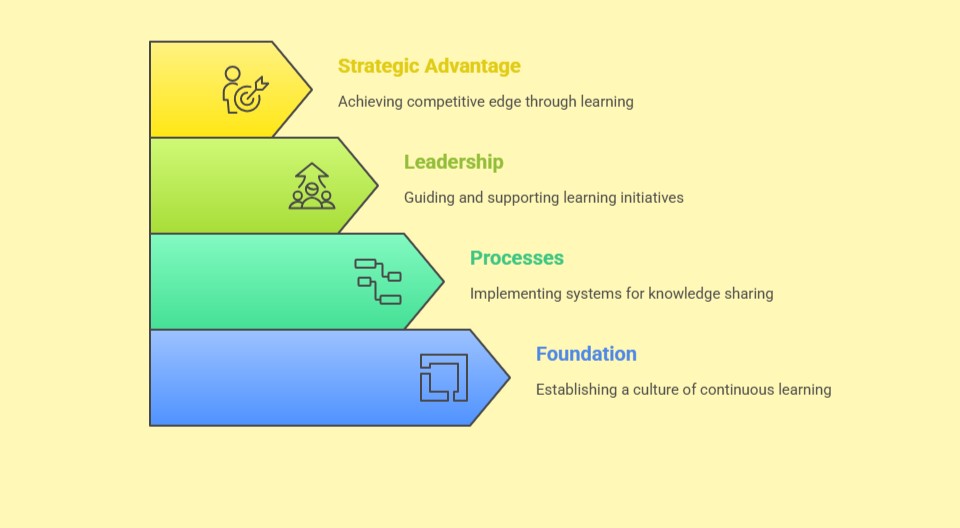
This transformative training course is meticulously designed to equip strategic leaders, managers, and organizational development professionals with the essential knowledge, principles, and practical tools to cultivate and sustain a dynamic learning organizational culture. In today’s rapidly changing and complex global environment, the ability of an organization to continuously learn, adapt, and innovate is no longer a luxury but a fundamental necessity for achieving and maintaining strategic advantage, fostering resilience, and ensuring long-term success.
The course will cover a wide array of crucial topics, including understanding the pivotal strategic imperative of building a learning organization, exploring the foundational “Five Disciplines” that underpin continuous learning, mastering techniques for fostering a culture of psychological safety and open dialogue, developing both individual personal mastery and critical insights into prevailing mental models, building a powerful shared vision and achieving strategic alignment through collective learning, enhancing team learning and enabling collaborative knowledge creation, applying robust systems thinking principles to understand and improve organizational learning dynamics, leveraging effective knowledge management strategies and modern learning technologies, understanding the critical role of leadership in initiating and sustaining organizational learning initiatives, and finally, establishing clear metrics and methodologies for measuring the tangible impact of a learning culture on strategic advantage.
Who Should Attend the Training
Objectives of the Training
Upon completion of this training, participants will be able to:
Personal Benefits
Organizational Benefits
Training Methodlogy
Trainer Experience
Our trainers are seasoned organizational development consultants, learning and development specialists, and strategic leaders with extensive experience in designing and implementing learning culture initiatives for diverse organizations. They bring a wealth of practical knowledge in adult learning principles, change management, and systems thinking, ensuring participants gain profound theoretical understanding combined with actionable skills for cultivating a truly learning organizational culture.
Quality Statement
We are committed to delivering high-quality training programs that provide tangible, transformative results. Our courses are meticulously designed, continually updated with the latest research and best practices in organizational learning, cultural transformation, and strategic management, and delivered by expert practitioners to ensure participants acquire relevant, effective skills and knowledge.
Tailor-made courses
We recognize that every organization’s learning journey is unique, influenced by industry, existing culture, and strategic goals. We offer customized training solutions that can be specifically tailored to your organizational context, specific challenges in fostering learning, current cultural dynamics, and desired strategic outcomes. Please contact us to discuss how we can design a bespoke program that aligns perfectly with your requirements.
Course Duration: 5 days
Training fee: USD 1300
Module 1: The Strategic Imperative of a Learning Organization
Module 2: The Five Disciplines of a Learning Organization
Module 3: Fostering a Culture of Psychological Safety and Open Dialogue
Module 4: Developing Personal Mastery and Mental Models
Module 5: Building Shared Vision and Strategic Alignment Through Learning
Module 6: Team Learning and Collaborative Knowledge Creation
Module 7: Systems Thinking for Organizational Learning
Module 8: Knowledge Management and Learning Technologies
Module 9: Leading and Sustaining Organizational Learning Initiatives
Module 10: Measuring the Impact of a Learning Culture on Strategic Advantage
Requirements:
· Participants should be reasonably proficient in English.
· Applicants must live up to Armstrong Global Institute admission criteria.
Terms and Conditions
1. Discounts: Organizations sponsoring Four Participants will have the 5th attend Free
2. What is catered for by the Course Fees: Fees cater for all requirements for the training – Learning materials, Lunches, Teas, Snacks and Certification. All participants will additionally cater for their travel and accommodation expenses, visa application, insurance, and other personal expenses.
3. Certificate Awarded: Participants are awarded Certificates of Participation at the end of the training.
4. The program content shown here is for guidance purposes only. Our continuous course improvement process may lead to changes in topics and course structure.
5. Approval of Course: Our Programs are NITA Approved. Participating organizations can therefore claim reimbursement on fees paid in accordance with NITA Rules.
Booking for Training
Simply send an email to the Training Officer on training@armstrongglobalinstitute.com and we will send you a registration form. We advise you to book early to avoid missing a seat to this training.
Or call us on +254720272325 / +254725012095 / +254724452588
Payment Options
We provide 3 payment options, choose one for your convenience, and kindly make payments at least 5 days before the Training start date to reserve your seat:
1. Groups of 5 People and Above – Cheque Payments to: Armstrong Global Training & Development Center Limited should be paid in advance, 5 days to the training.
2. Invoice: We can send a bill directly to you or your company.
3. Deposit directly into Bank Account (Account details provided upon request)
Cancellation Policy
1. Payment for all courses includes a registration fee, which is non-refundable, and equals 15% of the total sum of the course fee.
2. Participants may cancel attendance 14 days or more prior to the training commencement date.
3. No refunds will be made 14 days or less before the training commencement date. However, participants who are unable to attend may opt to attend a similar training course at a later date or send a substitute participant provided the participation criteria have been met.
Tailor Made Courses
This training course can also be customized for your institution upon request for a minimum of 5 participants. You can have it conducted at our Training Centre or at a convenient location. For further inquiries, please contact us on Tel: +254720272325 / +254725012095 / +254724452588 or Email training@armstrongglobalinstitute.com
Accommodation and Airport Transfer
Accommodation and Airport Transfer is arranged upon request and at extra cost. For reservations contact the Training Officer on Email: training@armstrongglobalinstitute.com or on Tel: +254720272325 / +254725012095 / +254724452588
| Course Dates | Venue | Fees | Enroll |
|---|---|---|---|
| Oct 13 - Oct 17 2025 | Pretoria | $1,300 |
|
| Sep 15 - Sep 19 2025 | Kisumu | $1,300 |
|

Armstrong Global Institute
Typically replies in minutes